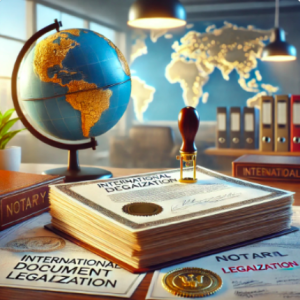Navigating the world of international document legalization can be a daunting task. Whether you’re a business expanding overseas or an individual relocating abroad, understanding the process of obtaining an apostille in Florida is crucial. This comprehensive guide by A Notary On the Go Florida will break down the complexities, offering clear explanations, practical tips, and valuable insights to ensure a smooth and successful experience.
Contents
 What is an Apostille?
What is an Apostille?
An apostille is a simplified form of document authentication recognized by countries that are part of the Hague Apostille Convention. It certifies the authenticity of the signature, seal, or stamp on a public document, making it valid for use in another member country.
Why Do I Need an Apostille in Florida?
If you plan to use a Florida-issued document in a foreign country that is part of the Hague Convention, you’ll likely need an apostille. This could include documents for business transactions, legal proceedings, educational purposes, or personal matters such as marriage, birth, or death certificates.
The Apostille Process in Florida
- Obtain the Original Document: Ensure your document is issued by a Florida state or local government official, such as a notary public, county clerk, or state registrar.
- Authentication: The document must be authenticated by the appropriate state agency, depending on the document type. For example, documents issued by a county clerk typically require authentication by the Florida Department of State.
- Apostille Issuance: Once authenticated, submit the document to the Florida Department of State’s Division of Corporations for apostille issuance. You can apply in person, by mail, or through an authorized third-party service provider such as A Notary On The Go Florida.
Types of Documents Requiring Apostille in Florida
- Business Documents: Articles of incorporation, certificates of good standing, powers of attorney, commercial invoices, and contracts.
- Legal Documents: Court orders, judgments, divorce decrees, adoption papers, and criminal background checks.
- Educational Documents: Diplomas, transcripts, certificates of enrollment, and letters of recommendation.
- Personal Documents: Birth certificates, marriage certificates, death certificates, and affidavits.
Expert Tips for a Hassle-Free Apostille Experience
- Start Early: The apostille process can take time, so plan and initiate the procedure well in advance.
- Double-Check Requirements: Each country may have specific requirements for document legalization, so verify the details before submitting your application.
- Seek Professional Assistance: If you’re unsure about any aspect of the process or need expedited service, consider using a reputable apostille service provider like A Notary On The Go Florida for expert guidance and support.
Obtaining an apostille in Florida doesn’t have to be overwhelming. By understanding the process and following the necessary steps, you can ensure your documents are ready for international use. Remember, proper planning and preparation are key to a smooth and successful experience.